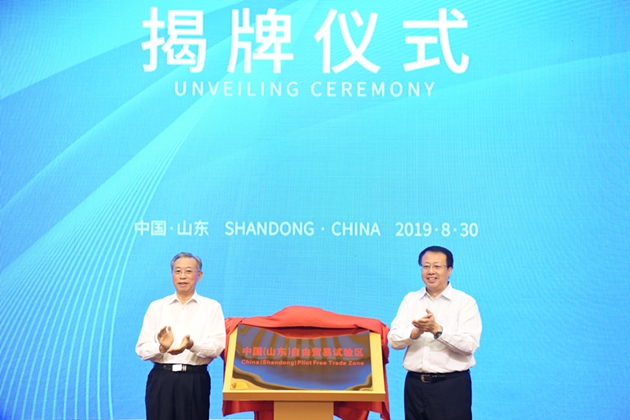Shandong taps into opportunities from FTZ
(chinadaily.com.cn)|Updated : 2019-11-01
Shandong was designated as a free trade zone as part of a national move to facilitate high-level opening-up and advance high-quality development through deeper reforms.
Liu Jiayi, Party chief of Shandong, said in a recent interview that its free trade zone status has placed Shandong on the forefront of the country’s opening-up, bringing numerous opportunities to the province.
Liu said that the free trade zone will serve as an engine of growth and innovation as the province promotes high-quality development and aims to build itself into a leader of China’s opening-up.
Shandong will take advantage of its free trade zone to adapt to the new global economic situation, continue to optimize its trade structure, facilitate more trade, and focus on better allocating global resources.
Shandong possesses unique regional advantages for international cooperation, especially with Japan and South Korea.
The free trade zone will allow Shandong to become more involved in China-Japan-South Korea regional economic cooperation, as well as the Belt and Road Initiative, and the province will play a bigger role in exchanges of capital, technology, talent, and information between the East and West.
Liu said that the Shandong FTZ will focus on institutional innovation and explore policies and practices that can be replicated in other provinces and regions.
It will explore new regulations and standards for streamlining administrative procedures to improve the business environment.
Liu said that Shandong will support and encourage Jinan, Yantai, and Qingdao, three cities within the Shandong FTZ, to pursue bold independent innovation and promote industrial development through institutional innovation.

Liu Jiayi (left), Party chief of Shandong, and Gong Zheng, governor of Shandong, unveil the Shandong FTZ on Aug 30. [Photo provided to chinadaily.com.cn]
Each city should tap into its own industrial advantages to enhance innovation and further open up.
The Jinan area will focus on the development of artificial intelligence, industrial finance, medical care, the cultural industry, information technology, and more.
It will carry out comprehensive pilot tests on the new opening-up system and build an important national economic center, logistics center, and scientific and technological innovation center.
Yantai will establish a pilot zone for China-South Korea trade and investment cooperation, a marine intelligent manufacturing base, and a demonstration zone for national scientific and technological achievements and international technology transfers and transformation.
Meanwhile, the Qingdao area will focus on the development of a modern marine industry, international trade, shipping logistics, modern finance, advanced manufacturing, and more.
It will build itself into an international shipping hub of northeast Asia, an important innovation center of eastern coastal areas, and a demonstration zone for the development of the marine economy. Its goal is to become one of China’s most important central coastal cities.












